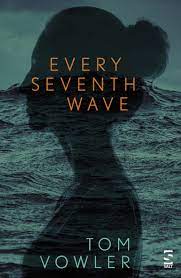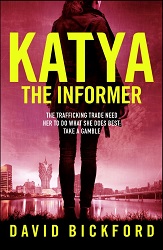You have no items in your cart. Want to get some nice things?
Go shopping
“And the waves surging in to unite with the fresh water, their advance a mathematical artillery, as was everything in nature, patterns repeating.”
There is a rolling, surging motion to all aspects of Tom Vowler’s third novel Every Seventh Wave such that the reader is carried along – cradled and jolted – by a sea that observes and alters the lives of each character. It is a rough sea, a taker of lives, a luring, viscous force that conceals an ancient submerged oak forest, that day by day consumes the precarious childhood home fraught with cruel memory inhabited by Hallam, a sea-bitten, life-scarred man. The novel hinges upon Hallam’s action as a saviour: He rescues a trafficked Romanian woman who wishes to drown – an irony given that Hallam has skimmed as flotsam over his own adulthood and more than most needs to be saved. Few books open so powerfully, wrenching the reader into a tossing dark sea hungry for death, with ex-prisoner and social misfit Hallam losing his beloved boots to the struggle but gaining a blessed interlude in this life through the luminous form of Anca, who tugs at his carved-out core.
Vowler’s language is intricately compelling, as detailed and fluxing as the sea itself. Both playful and instructive (I had to look up flensing!), we read of a dead seal that has its “flank corkscrewed open,” a house that is “quarried” under by the shifting coastline; a sleeping dog whose “whining thinned to nothing and was replaced by a cadent snore”; land that is “exposed flesh, the sea a scalpel,” as we feel the pounding of every seventh laden wave. On the afternoon that the boy Hallam’s life will be punctured forever, “time slid by, as if at their behest, fitting around their movements, dictating nothing,” and Hallam watches as “blue leavened through the latticed cluster of the tree’s limbs, bobbing and weaving like a boxer.” By contrast, when used by Anca’s traffickers, this same language pulls back to a chilling, elemental English: “Even if the lure of a better life had convinced them to lie down in a dark hole in the floor with strangers at the start of the journey, one often panicked, setting them all off.”
Vowler’s Anca is a lucid, tangible creation, not without risk, given that there is no shortage of both cinematic and written works that speak of the sexual slavery of women: horrifying compartments within trucks; the drugged raping and cigarette burns on forearms; the disorientation of these women stolen from their own lives. Even Anca’s degradation is conveyed warily, without lingering or voyeurism – no easy task given the ugly appropriation in the rapports involved. We feel her imploring her God. We sense her divorce from her body and her jarring realisation of its worth, how her wading into the sea is an act of discord that an unwilling Hallam is stationed to witness.
Described as a literary thriller, I think the novel is more of a contemporary story with a wounded heart. Vowler’s previous novels – That Dark Remembered Day, What Lies Within – could more easily be termed literary thrillers, with their dark uncoiling plots, but in Every Seventh Wave he employs his extensive and renowned skills as a short story writer. Two prize-winning collections – The Method and Dazzling the Gods – are perhaps closer to the fretwork of Every Seventh Wave, which shares their ferocious attention to detail through visceral and sometimes baroque language that frankly investigates the terrain between women and men, and the deep history of families. Vowler is a great reader of the subterfuge of bodily sensations – trauma, fear, desire – and how these may be betrayed by ill-framed communication or the wretched events that occur in people’s lives. Many writers find it difficult to transpose the exactitude required by the short story form to the volume of the novel, but in Every Seventh Wave, Vowler does this ably – utilising the shape and motion of waves as the structure by which interwoven story elements build up as an advancing and irreversible tide.
The book’s plot is tight and merciless, as though Hallam’s path can only involve further violence and mourning, yet we see him as he amplifies as a man, conceding small and unknown joys within his being, inching towards revelation and happiness. The battered childhood house however, poised above the sea, soon to splinter into its maw, is too powerful a symbol: We will follow Hallam, we will observe him, we will hope for him.
Every Seventh Wave
By Tom Vowler
320 pages, Salt Publishing

About Catherine McNamara
Catherine McNamara grew up in Sydney and went to Paris to study French. She ended up in West Africa running a bar. Her short story collection 'The Cartography of Others' is finalist in the People's Book Prize and won the Eyelands International Fiction Prize. Her flash fiction collection 'Love Stories for Hectic People' is out in May. Catherine lives in Italy and has great collections of West African sculpture and Italian heels.
- Web |
- More Posts(13)




